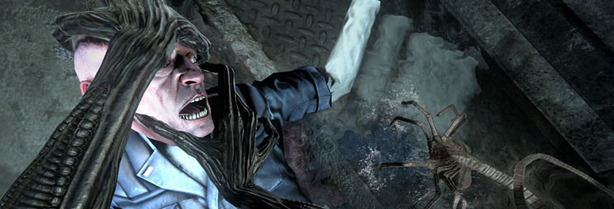
Aliens vs Predator Hands-On Preview
Publisher: SegaPlatform: Xbox 360, PC, PS3
Release Date: February 19th, 2010
Sitting down at Rebellion’s Oxford HQ to play Aliens vs Predator on a projector the size of my flat was an unnerving experience – and that’s a sentence which I’ve put together very carefully because it tells you nearly all you need to know about the game. The most important thing in it is that the game is unnerving rather than explicitly scary. It’s tense, not terrifying and that in itself marks a rather dramatic departure from Rebellion’s previous AVP game.
There’s lots more to extract from the summary, such as the very wry sense of British humour that Oxford-based Rebellion has woven through Aliens vs Predator and the fact that I need a bigger flat, but the crucial thing is the atmosphere that Rebellion has tried to establish. It’s a far cry from how things were in the 1999 classic and though that’s something likely to worry franchise faithfuls, we think it’s actually A Good Thing.
Aliens vs Predator is still scary and the Marine campaign still captures that same feeling of vulnerability that made the 1999 game such a seminal thriller, but the the nature and style of the horror has changed. Aliens vs Predator is more of an intelligent shooter that relies on a genuinely chilling atmosphere and slowly creeping dread, rather than something that has players just worried about running out of save slots. It’s what Rebellion CEO Jason Kingsley called the difference between scariness and suspense when we interviewed him recently.
What that means for the Marine is that while the odds are still stacked against you, survival is something that most players can actually hope to reach as long as they are mindful of their enemy. In the old AVP it didn’t matter how slowly or carefully you crept through the levels, you’d still end up as a bloody smear eventually thanks to the mercilessly claustrophobic levels, but the new game isn’t quite as punishing. Or, rather, it’s a lot more fair in how it chooses to punish you. If you mess up then it’s likely your fault, not the games’.
That doesn’t mean the game is easy though and Rebellion is constantly pushing players to keep the nature of their enemy in mind. Forget what it is you are fighting and start treating AVP like any other sci-fi shooter and you’re likely to end up dead rather quickly. That’s exactly what happened to us when we, having easily survived a few skirmishes, were so buoyed up with confidence that we forgot to check our environment when the next wave of Xenomorphs came. Backpedalling into an Alien corpse and getting killed by a puddle of acidic blood isn’t a great way to impress…well, anyone.
This theme of rewarding careful players with steady progress is something that holds true across all three campaigns – Marine, Alien and Predator. Playing as the Predator especially can be an educational experience as when you slip up you have nobody to blame but your own confidence. Between the Predator’s invisibility cloak and ferocious prowess at any range there’s really nowhere else to lay the blame.
At the same time the Alien, who only has close-range attacks and who mostly depends on stealth and agility, is challenging in a different way. There the balancing still encourages intelligent play, but forces you to replace the Marine’s caution with outright aggression. You are a killing machine afterall, so there’s no room for any of the constant corner checking that marks the Marine campaign – far better to charge in at distracted enemies and take kills whenever you can get them.
Either way, the only way to progress in Aliens vs Predator is by playing to your strengths, whether that’s rushing through air vents, staying close to the light or just sitting back and choosing your targets carefully. Aliens vs Predator holds something for everyone in that way and the fact that the difficulty curve is now actually a gentle slope rather than an impassable wall means that it’s an easily accessible game too.

MSI MPG Velox 100R Chassis Review
October 14 2021 | 15:04











Want to comment? Please log in.